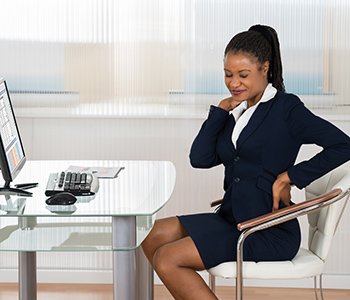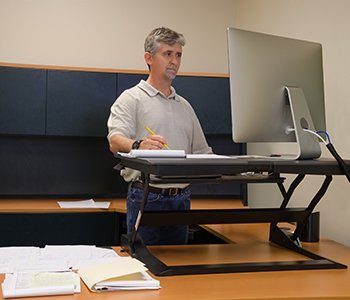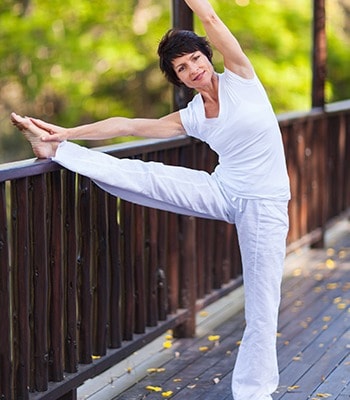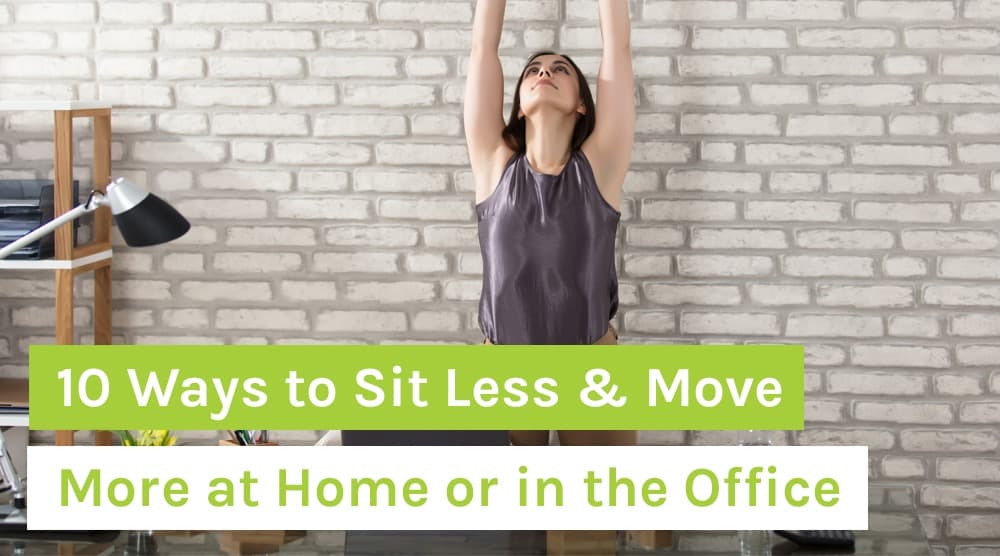10 Ways to Sit Less & Move More at Home or in the Office
In a hurry? Click here to read the Article Summary...
Seventy percent of fulltime American workers spend the majority of their day sitting in a chair. In fact, studies have found that Americans in general spend about 13 hours a day on their rear ends. New research is discovering just how bad this is − and why we need to move more.
Why Movement is Vital for Your Health
 Maybe you heard the phrase: Sitting is the new smoking.
Maybe you heard the phrase: Sitting is the new smoking.
This sounds like a pretty harsh statement; perhaps even a little alarmist. After all, how can being stationary be worse that inhaling known carcinogens? But recent research into the subject is saying just that.
The recently popular saying was coined by Dr. James Levine, famed endocrinologist and world expert on obesity, principle investigator at the US National Institutes of Health (NIH), and director of the Mayo Clinic-Arizona State University Obesity Solutions Initiative.
Levine himself puts the seriousness of stagnation in perspective:
“Sitting is more dangerous than smoking, kills more people than HIV and is more treacherous than parachuting. We are sitting ourselves to death.”
In particular, studies by Levine and others have shown that lack of movement is not only connected to obesity, but can also impair aerobic capacity, cognitive function, muscular-skeletal metabolism, and genetic stability. It can lead to depression, hip and back fracture, and certain kinds of cancer − including colon and breast.
It’s About Making the Commitment to Move More
All that being said, the solution to lack of movement is fairly easy. You guessed it − more movement!
If you don’t have use of a standing desk or desk treadmill (see below), or even if you do, most of the suggestions mentioned below rest on the commitment YOU need to make to give your butt a break at least every hour (every half hour is ideal).
We’ve all been there: when we are under a time crunch or are deeply involved in what we are doing, it is easy to forget. A simple way to get yourself to STAND UP AND MOVE AROUND at regular intervals is to set an alarm on your phone, on an alarm clock or through an online site as a reminder.
This strategy has a positive psychological effect as well. For under-the-gun workers putting in long hours on big projects, breaking up the time one works on the project into smaller chunks (and smaller time chunks as well) can help prevent overwhelm, according to the University of Georgia and others.
10 Easy Ways to Move at Home or at the Office
Here are 10 ways that office workers can sit less and move more during the day. And even if you don’t work at a desk job, tips 4 through 10 are great for anyone to do day or evening to get up off the coach or away from a device for a few minutes.

#1 – Use a standing desk.
Standing desks are becoming very popular in the office setting, for home use, and also on the go with smaller portable units that can fit on top of a regular table or desk. Make sure you wear comfortable shoes while you stand and you may also want to invest in an anti-fatigue mat for prolonged standing.
Note: If you use a standing desk, experts still advise that you take breaks to move around, stretch and get blood flow going periodically. If you work at a computer, this will give your eyes a break from the screen too.
#2 – Use a “balance ball chair.”
Another option if you must to sit is to use a “balance ball chair” which will allow your body to stretch through micromovements while you work. The ball and the stand usually come as separate units and the whole thing can be easily purchased for under $200.
What’s more, with most units, the ball simply rests on the chair stand so when you want to do a full ball workout, all you have to do is take the ball out of the stand and you are ready to roll.
#3 – Get an office tread mill.
This modality is the ultimate for those who want a work-workout combo. If you have the money to spend (they go for about $2,000 up to several thousand), a treadmill desk will keep you in motion while you type, talk, or search.
For the more budget-conscious, options also exist for stand-up as well as low-sitting bicycles specifically designed to be used at a desk. Check online for available options.
#4 – Use a portable rebounder.
Another option for room or office-ready mini-workouts is to get yourself a small, portable trampoline, also called a rebounder. Research on immune and lymph system health indicates that rebounding is one of the best forms of exercise for these systems. What’s more, modern day rebounders are small and many come with a carrying case they can be folded into when you travel (or if you want to take it to work with you).
You can use the rebounder while you stand and slightly bounce while you work and you can also use it for more directed movement during a quick break; just a few minutes of rebounding can do wonders for your cardio and lymph systems.
Rebounders range in price from under $100 for stationary units to around $500 for top-of-the-line foldable trampolines.
#5 – Use the dog as an excuse.
Do you work at home and own a dog? That’s great news! Instead of trying to get him or her to stop staring at you while you work, why not use your pup as an excuse for a quick jaunt outside for some playtime? Throw the ball or frisbee for a few minutes or grab the leash and take him for a bathroom break. Your dog will love you and you’ll love the fresh air (if you own a cat, you’re on your own).

#6 – Do some standing stretches.
If you are REALLY on deadline or just can’t afford 5 minutes to get moving, here is a quick and effective stretch that will give you instant energy and stop your back and typing muscles from atrophying: The Donna Eden “Egyptian Stretch.”
As Donna says herself, this is probably the most ancient stretch there is. Simply extend one arm up as high as it will go. Reach for the ceiling or the sky with that arm while the other arm reaches for the floor. Lift your toes and stretch your entire body while you breathe in deep. Exhale to release and change sides.
Other stretches you can do include bending at the waist and letting your hands dangle to the floor then swaying from side to side for 10-15 seconds (be sure to come up slowly) as well as… bouncing! Simply vibrate your entire body while standing and breathing deep for one to two minutes. You will be surprised at how energized this simple exercise can make you feel.
#7 – Take a short walk.
Get out of your chair, change into your athletic shoes, put on a jacket if you need to, set your timer and get outside! A brisk 5-10 minute walk around the block or the parking lot can do wonders for your mental and physical state.
If you are able to use your phone on speaker mode, why not take that important phone call while walking? Setting up “walking meetings” with colleagues and clients is also a great way to get business done and keep your body moving.
#8 – Practice Deep Breathing.
Stand up and breathe deeply in and out 5-6 times, inhaling for 4 seconds, holding for 4 seconds and exhaling for 4 seconds each time. For a more intense experience, while standing or sitting, practice the “breath of fire.”
Extend your arms in the air, make fists with your hands while keeping your thumbs extended and breathe fast for 30 seconds to a minute, pumping your stomach while you do this. Then slowly release your arms to your sides. This is an ancient yogic modality that is designed to help the nervous system and give instant energy.
If you are still feeling stressed or lethargic, consider a few more minutes of gentle breathing while doing Emotional Freedom Technique (EFT), which is designed to lower stress directly within minutes.
#9 – Clean Something.
If you work at home, save making your bed for your first break of the day. Vacuum, dust, do some laundry, or weed the walkway. If you are at your office, take out the trash, stand up and dust a shelf, sweep or vacuum if you can. All of these actions are ways to move your body without calling it a “workout.” Set a timer for 5 or 10 minutes or choose to just do one chore for each stretch break you have during the day.
#10 – Dance!
Okay, you may not be able to do this if you work amongst a large number of people, but if you have an office where you can shut the door or you work at home, this option for movement during the day can be very effective, and also a whole lot of fun.
When your timer goes off for your break, choose an upbeat, positively-focused song (makes sure it’s one of your favorites!) and commit to getting down for the duration of the song.
Most popular songs are between 2 minutes and 5 minutes long, creating the perfect little time bubble to get your groove on and your body moving. What’s more, it will probably put a smile on your face as well!
More Helpful Hints for a Healthy Workday
 Periodic or continual movement while you work will do wonders for your productivity and mental state, not to mention your physical health.
Periodic or continual movement while you work will do wonders for your productivity and mental state, not to mention your physical health.
In addition, follow these other guidelines to stay alert, sharp and balanced during your work day:
- Use EMF protection in your workspace to protect from electro-pollution from computers, cell phones and wireless routers.
- Drink plenty of water throughout the day and eat a light, vegetable-focused lunch. Heavy eating, especially too many carbs, can cause extra lethargy and “brain fog” as your body struggles to digest all that food. Drinking plenty of fresh, filtered water helps your body to detox and keeps you more energized.
- Use essential oils to energize in lieu of that extra cup of coffee. A few drops of peppermint oil on the temples or breathed in from the palms can have an instantly energizing effect.
- Go outside at least once or twice during the day. Unfortunately, studies show that indoor pollution is often much worse than outdoor pollution − so much so that some researchers have coined the term “sick building syndrome” for the symptoms related to consistently being exposed to indoor contaminants.
Want to Be Healthier? Sit Less & Get Moving!
Inactivity can be dangerous for your health, and not just according to Dr. Levine. Physical inactivity is the fourth-leading risk factor for death and leads to an estimated 3.2 million deaths worldwide, each year according to the World Health Organization.
If you think about it, this makes perfect common sense. There was a time − before the era of obesity, chronic disease and exponential cancer rates − when the average individual spent most of his or her day in movement, either working on a farm, doing household chores, or walking, stooping, and running in order to gather the necessities of life.
Of course, most of us are living in very different times, but that doesn’t mean that our bodies don’t need the same amount of physical activity that they did back then. They do! What our new reality (and your healthy body) needs now is just a little bit of added creativity in order to move more — and thrive! − in the modern world in which we live.
Better Focus… Crystal-Clear Thinking… a Razor-Sharp Memory… ALL Are Within Your REACH! Each and every bottle of our Organixx Brain Health 8 formula contains a total of 8 superstar ingredients, straight from the AMAZON rainforest.

 Sources:
Sources:
Article Summary
70% of fulltime American workers spend the majority of their day sitting in a chair.
“Sitting is more dangerous than smoking, kills more people than HIV and is more treacherous than parachuting. We are sitting ourselves to death.”
Studies show that lack of movement is not only connected to obesity, but can also impair aerobic capacity, cognitive function, muscular-skeletal metabolism, and genetic stability.
10 easy ways to move at home or at the office:
- Use a standing desk
- Use a “balance ball chair”
- Get an office tread mill
- Use a portable rebounder
- Use the dog as an excuse
- Do some standing stretches
- Take a short walk
- Practice Deep Breathing
- Clean Something
- Dance!
Want to be healthier? Sit less & get moving!





I would love to be able to do what I once did , but I was recently diagnosed with Rheumatoid Arthritis , and am not able to stand for more than 10 minutes , I now worry about the lack of movement , is there anything that I can do I use a rollator to get around
Hi Palema, I am so sorry to hear about the health concerns you are currently facing. Please check out our blog posts that mention rheumatoid arthritis. I hope you find some helpful information contained in them. There are quite a few on the search page I am linking here : https://organixx.com/?s=Rheumatoid+Arthritis Sending healing vibes your way. Wishing you a happy and healthy New Year!
Dear Nikki, It was awesom to get your rich mail, with so many practical advices. A very nice start of the new year, with resolutions for the beter
maitenance of our dear body, and soul. Thank you so much for sharing. Herewith my best wishes to you from The Netherlands - Magda Tsfaty
We have to be healthy and strong.
Hi Magdalena, thank you for being here with us. We are so happy to learn that you find the information provided useful. We will continue to post more useful information like this in the future. Wishing you a happy and healthy New Year!!!!!
With standing desk, you can use a stool to put one foot up.
That changes balance and remove weight temporarily on one foot.
S.
EMF protection? How?
Synergy science........ EMF protection.... https://www.synergyscience.com/qi/
No mention here about being careful of the bending at the waist to touch the toes, as this is very dangerous for people with Osteoporosis of the spine. People without this condition are obviously OK with the movement, but there are many people who work in offices who suffer with Osteoporosis. When people with painful backs try to stand for any length of time this becomes unbearable, so what suggestions do you have for them please? Also people in wheelchairs will be scared after reading this article, so any ideas for them please?
Actually, no one should bend at the waist. It puts too much strain on the discs. Regular bending at the waist will eventually cause the discs to bulge. We should all be hinging from the hips instead. This is what people in Asia, who work in the fields all day do and they have a much lower incidence of back problems than westerners do. See Esther Gokhale's book "8 Steps to a Pain Free Back" and her website gokhalemethod.com.